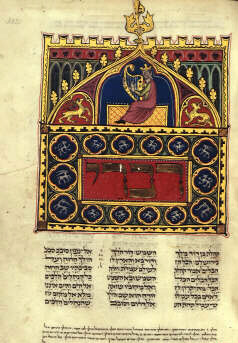 June 06
June 06
Live By No Man's Code: The Religious Forms of Philip Roth's "Everyman"
by Stephen Hazan Arnoff
p. 3 of 3
Links between the irresistible drive for sex in both Everymanand the story of Eleazar ben Durdia are obvious. Roth's characters have slept their way around the world just like their rabbinic forbearer. Eleazar's promiscuity crashes him up against his own potential to be redeemed. The hero of Everyman, perhaps in a tamer way than many of Roth's earlier protagonists, crashes up against social propriety, but seeks no redemption and asks for no purification at the end of his life. While Eleazar ben Durdia resolves the conflict of morality and mortality with the weeping of repentance accepted by the divine realm, Roth's Everyman comes to his final shore with pain and loneliness, even as he is girded by an almost nihilistic, personal code. He is resigned and unrepentant.
All is Hot Air
 King Solomon – traditionally credited with writing The Book of Ecclesiastes (Kohelet in Hebrew), Proverbs (Sefer Mishlei), and the Song of Songs (Shir HaShirim) – shares a costly fascination with women with Roth’s hero and Eleazar ben Durdia. It is said that Solomon – whose father David killed Uriah for the love of the bathing beauty Bat-Sheva, Solomon's mother – had one thousand wives, consorts, and concubines. A typically complex biblical figure, his desire and hubris lead not only to habitual womanizing, but also to the construction of the Temple in Jerusalem, arguably the pinnacle institutional religious accomplishment of the Hebrew Bible. It is also taught that the elderly Solomon wrote The Book of Ecclesiastesafter a lifetime of battles won and lost in fields both personal and public. At times bitter, but mostly grounded in stoic resignation on the meaning of morality and mortality, The Book of Ecclesiastes contains the famous verses "To everything there is a season and a time for every purpose under heaven..." However, the most interesting textual parallel between The Book of Ecclesiastes, Everyman, and Eleazar den Durdia is the first line of the biblical text:
King Solomon – traditionally credited with writing The Book of Ecclesiastes (Kohelet in Hebrew), Proverbs (Sefer Mishlei), and the Song of Songs (Shir HaShirim) – shares a costly fascination with women with Roth’s hero and Eleazar ben Durdia. It is said that Solomon – whose father David killed Uriah for the love of the bathing beauty Bat-Sheva, Solomon's mother – had one thousand wives, consorts, and concubines. A typically complex biblical figure, his desire and hubris lead not only to habitual womanizing, but also to the construction of the Temple in Jerusalem, arguably the pinnacle institutional religious accomplishment of the Hebrew Bible. It is also taught that the elderly Solomon wrote The Book of Ecclesiastesafter a lifetime of battles won and lost in fields both personal and public. At times bitter, but mostly grounded in stoic resignation on the meaning of morality and mortality, The Book of Ecclesiastes contains the famous verses "To everything there is a season and a time for every purpose under heaven..." However, the most interesting textual parallel between The Book of Ecclesiastes, Everyman, and Eleazar den Durdia is the first line of the biblical text:
The words of Kohelet [Solomon], son of David, king in Jerusalem: Vanity of vanities, says Kohelet, vanity of vanities: All is vanity.
The classical English translation of this verse does not carry the richness of the original Hebrew, Hevel hevelim,. The word "hevel, " can also be translated as "folly." Namely, life is a "folly of follies" – all is meaningless, all a waste of time. An even tighter reading suggests translation of "hevel" as the Hebrew term denoting "breath," or, even closer, "hot air." Life is ether. Life is gas. Life consists of molecules floating without aim in the endless spheres of the endless universe and everything passes in the end…or through the end. This same sentiment can be found in the colloquial terms of the prostitute in the Eleazar den Durdia story: "Without redemption, life is like a fart. It is a gas. It passes…And it stinks." Roth's Everyman knows this truism well. The affair that destroys his one seemingly stable marriage is driven by his inability to keep away from the "little hole" of a Danish model. He literally cannot stay away from entering her behind and this turns his life to crap.
Solomon works his way towards resolution of the seeming meaninglessness of life at the close of The Book of Ecclesiastes, stating that, despite all doubts and conflicts, one must "fear God" and live a life of doing God's will through proper practice. There is some controversy about the general intent of this sentiment in the text. Both contemporary and traditional scholars suggest that an ideological code in line with more "mainstream" views is presented by the author or later editors in order to make an otherwise challenging, iconoclastic moral code more palatable. But The Book of Ecclesiastesis an example of "wisdom literature," and much like The Book of Job it is a mixture of philosophy, challenge, submission and sheer dilemma upon which the reader must meditate. The strong urge within the text for stoic resignation in the face of the constant ebb and flow of life – fortune and penury, joy and despair, love and loneliness, ecstasy and fear – is not any less vibrant because of conflicting statements about other kinds of faith. As a whole, the text exhorts courage for living amidst worldly paradox, just as much later Jewish poet Bob Dylan would sing in "I Am a Lonesome Hobo" (1968):
Kind ladies and kind gentlemen,
Soon I will be gone,
But let me just warn you all,
Before I do pass on;
Stay free from petty jealousies,
Live by no man's code,
And hold your judgment for yourself
Lest you end up on this road.
Solomon warns, the prostitute reminds, and Eleazar understands: life is transparent, absurd, unpredictable, and as the Poet says, blowin' in the wind.
Roth as a Marginal Prophet
Philip Roth does not need to be a rabbi or a priest or to be even remotely connected with religious practice or belief in order to write a religiously meaningful fable for times that demand much resignation and courage from those – religious and secular – who stand against religious hypocrisy and the rationalization of the religious impulse. Max Weber once wrote:
No one knows who will live in this [iron] cage in the future, or whether at the end of this tremendous development entirely new prophets will arise, or there will be a great rebirth of old ideas and ideals.
Could it be that Philip Roth is one of these "marginal prophets" challenging the ghosts of religion and stalking the iron cage? Sigmund Freud – the figure who inspired Roth's Dr. Spielvogel and a rich source of both parody and insight for Roth and his contemporaries – shares Roth's ideological rootedness in sexual conflicts as well as a rationalistic disbelief in soul and salvation. The two also share an interesting overlap in the symbolic use of the ocean as a metaphor for the limits of life imbalanced towards scientific, rational tendencies – the tendency which Freud's contemporary Weber warned against. Beginning in 1923, Freud corresponded with Romain Rolland, a French novelist challenging that Freud's writings on religion had quite missed capturing the essence of the religious ethos. Rolland claimed that a proper theory of religiosity must describe the essential "oceanic feeling" of emotional and spiritual connectedness within which a person of religious temperament experiences life. Writing with admiration if not full recognition for Rolland's challenge in Civilization and Its Discontents, Freud reveals much about himself and his intellectual path: "I cannot discover this oceanic feeling in myself. It is not easy to deal scientifically with feelings." While Freud and Roth share a scientific fascination with unraveling the inner motivations of people, Roth, as an artist, releases his imagination not only to the investigation of morality and mortality, but also pursues a fully engaged, empathic description of the experience of the "oceanic feelings" for his characters. Despite claims to be "anti-religious,", Roth's work is thick with religious meaning. In a fable of contemporary death and dying, his hero ends his earthly days with a plunge into primal, cleansing waters. This is the place, at the end of a retelling of an ancient religious motif, where the bars of rationality break open and the reader is asked to pause for a long, deep breath. Here, a person just like the reader has watched his life pass before his eyes. The reader is asked to meditate without preconceptions beyond the body, where new, iconoclastic, redemptive questions of meaning can begin. In engaging the very same raw, ineluctably religious material as countless sages, demogogues, prophets, poets, and kings, a contemporary secularist driven to strip away religious hypocrisy stares down a world hobbled by religious violence, divisions, and lies. The symptomatic shadows of tradition fall away as the dogmatic burdens of morality and mortality dissolve. A marginal prophet guides the reader's heart towards "oceanic feeling" though the lonely, finite journey of a fictional hero – and that is why this book is called Everyman.









